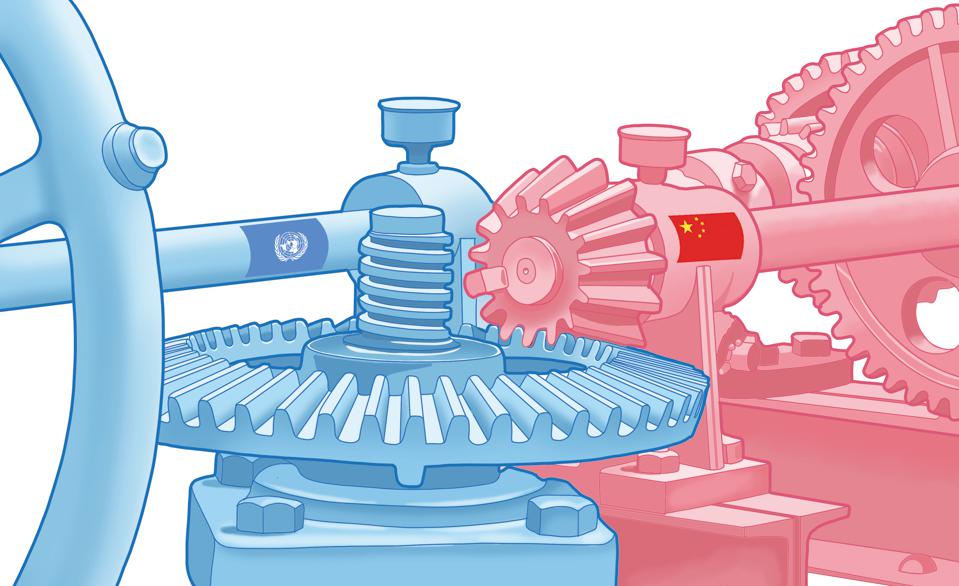 JIN DING/CHINA DAILY
JIN DING/CHINA DAILY
This year marks the 100th anniversary of the founding of the Communist Party of China, and also the 50th anniversary of the restoration of China's lawful seat at the United Nations and the 20th anniversary of its accession to the World Trade Organization.
The People's Republic of China was founded in 1949 in the Cold War era. On Nov 15, 1949, Zhou Enlai, then Chinese premier and minister of foreign affairs, sent messages to the secretary-general of the UN and the president of the UN General Assembly, formally proposing the PRC be entitled to UN representation. Afterward, China engaged in 22 years of diplomatic efforts and political struggle to for its legal rights in the UN. It was not until the 26th UN General Assembly passed Resolution 2758 on Oct 25, 1971, that the PRC was recognized as the only legitimate representative of China to the UN.
A place in the UN provided key opportunities for China, which once faced international isolation, to improve its external environment. The improvement and establishment of diplomatic relations with Western countries greatly helped to reduce external pressure on China. China also joined UN agencies and participated in UN affairs through international cooperation. And as one of the five permanent members of the UN Security Council, it has been able to fulfill its responsibilities as a major country in international diplomacy.
The UN has set the tone for international system and order after World War II. If China, with one-fifth of the world's population, was not involved, the UN would not be inclusive.
During the Cold War, China served as a major supporter of developing countries in Asia, Africa and Latin America and their interests and demands. In April 1974, the late Chinese leader Deng Xiaoping expounded on the "Three Worlds" theory at the sixth special session of the UN General Assembly, promising that China would never seek hegemony, greatly changing the political atmosphere.
In the 1970s, the International Development Strategy for the UN Development Decade was initiated, which helped promote the establishment of a new international political and economic order, drove North-South dialogue, strengthened assistance to underdeveloped countries, and allowed more candidates from Third World countries to be appointed UN secretary-general.
Since then, development has become an important mission of the UN, making it shift from being an arena for the confrontation between the East and the West to becoming a major contributor to international cooperation.
China's place at the UN has references for its further development and improved relations with other countries. First, opening-up is the only approach to development for China. A place at the UN in 1971 created a favorable international environment for China's reform and opening-up in the late 1970s.
In 1972, China's relations with major Western developed countries improved, with the establishment of diplomatic relations with countries such as the United Kingdom, the then Federal Republic of Germany, Japan, Australia and New Zealand. Sino-US relations also thawed that year. At the same time, China offered firm support to developing Asian, African and Latin American countries at the UN, laying a solid foundation for its opening-up.
After over 40 years of development, China's power, international status and influence have grown. It needs to keep widening its doors for further development, especially by participating in rules-based international cooperation and competition.
Second, cooperation with the UN is a highlight of China's diplomacy. While the UN has provided much assistance and support for China's development, China has offered political, moral and financial support to the UN causes of upholding peace, development and human rights.
China has become a strong supporter of the international system and order with the UN at its core, as well as multilateralism and global governance. China-UN cooperation in building a community with a shared future for mankind, developing new international relations, and promoting the Belt and Road Initiative is important for China's diplomacy in the new era.
China can make key contributions to global sustainable peace and development. It can carry out diplomacy and play its role as a major country through the UN. In the face of changes unseen in a century and challenges brought by the novel coronavirus outbreak, Sino-UN cooperation will bring certainties to the world amid uncertainties.
Last, improving relations with the outside world, including its neighboring countries as well as other major and developing countries, remains a priority for China. Through the UN as an authoritative international organization, China can make its voice heard and share its experience of rapid development with a large population.
While Western countries may learn more about China's political systems and development model, China needs to be open to international rules while upholding its principles.
Both China and the UN are constructive and stable force in addressing global issues such as climate change and public health, reforming the global governance system, and advancing sustainable peace and development. China will continue to further the cooperation with the UN, firmly supporting, defending and participating in the cause of the latter, and upholding multilateralism.
(Zhang Guihong, a professor and director of the Center for the UN and International Organizations at Fudan University. The views do not necessarily reflect those of China Daily.)






